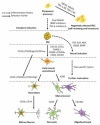Neural Stem Cell Transplantation for Neurodegenerative Diseases
- PMID: 32354178
- PMCID: PMC7247151
- DOI: 10.3390/ijms21093103
Neural Stem Cell Transplantation for Neurodegenerative Diseases
Abstract
Neurodegenerative diseases are disabling and fatal neurological disorders that currently lack effective treatment. Neural stem cell (NSC) transplantation has been studied as a potential therapeutic approach and appears to exert a beneficial effect against neurodegeneration via different mechanisms, such as the production of neurotrophic factors, decreased neuroinflammation, enhanced neuronal plasticity and cell replacement. Thus, NSC transplantation may represent an effective therapeutic strategy. To exploit NSCs' potential, some of their essential biological characteristics must be thoroughly investigated, including the specific markers for NSC subpopulations, to allow profiling and selection. Another key feature is their secretome, which is responsible for the regulation of intercellular communication, neuroprotection, and immunomodulation. In addition, NSCs must properly migrate into the central nervous system (CNS) and integrate into host neuronal circuits, enhancing neuroplasticity. Understanding and modulating these aspects can allow us to further exploit the therapeutic potential of NSCs. Recent progress in gene editing and cellular engineering techniques has opened up the possibility of modifying NSCs to express select candidate molecules to further enhance their therapeutic effects. This review summarizes current knowledge regarding these aspects, promoting the development of stem cell therapies that could be applied safely and effectively in clinical settings.
Keywords: cell therapy; neural subpopulation; neurodegenerative disease; neuronal stem cells.
Conflict of interest statement
The authors declare no conflict of interest.
Figures



References
Publication types
MeSH terms
Substances
Grants and funding
LinkOut - more resources
Full Text Sources
Other Literature Sources
Medical

